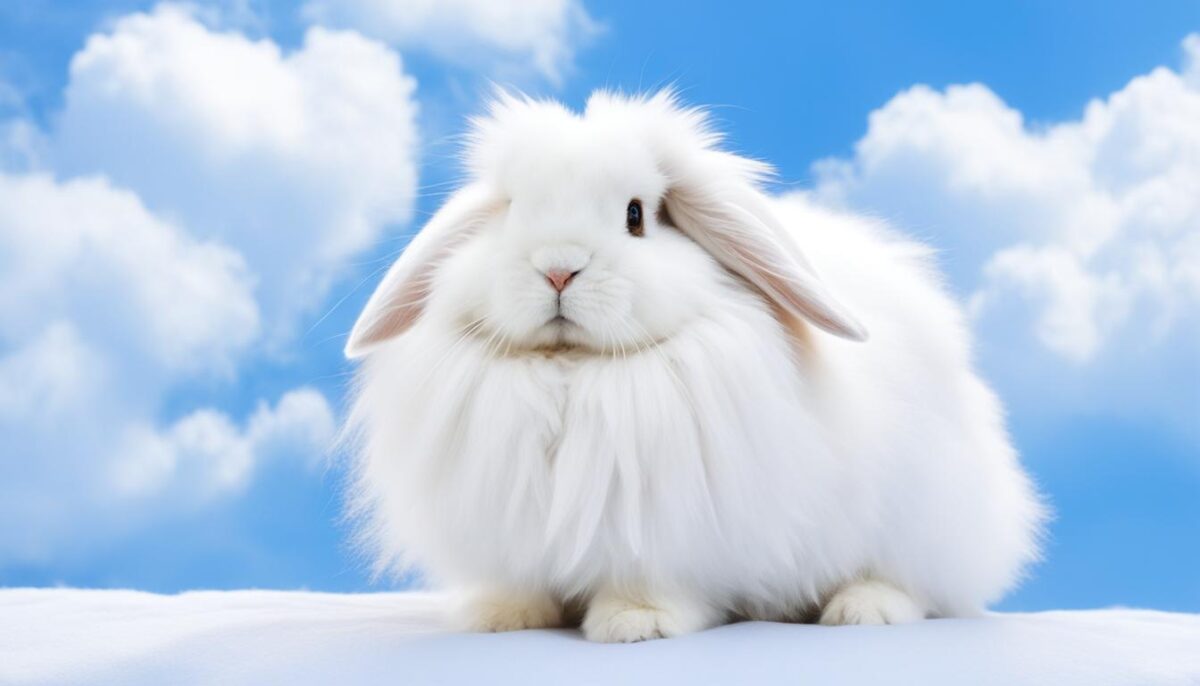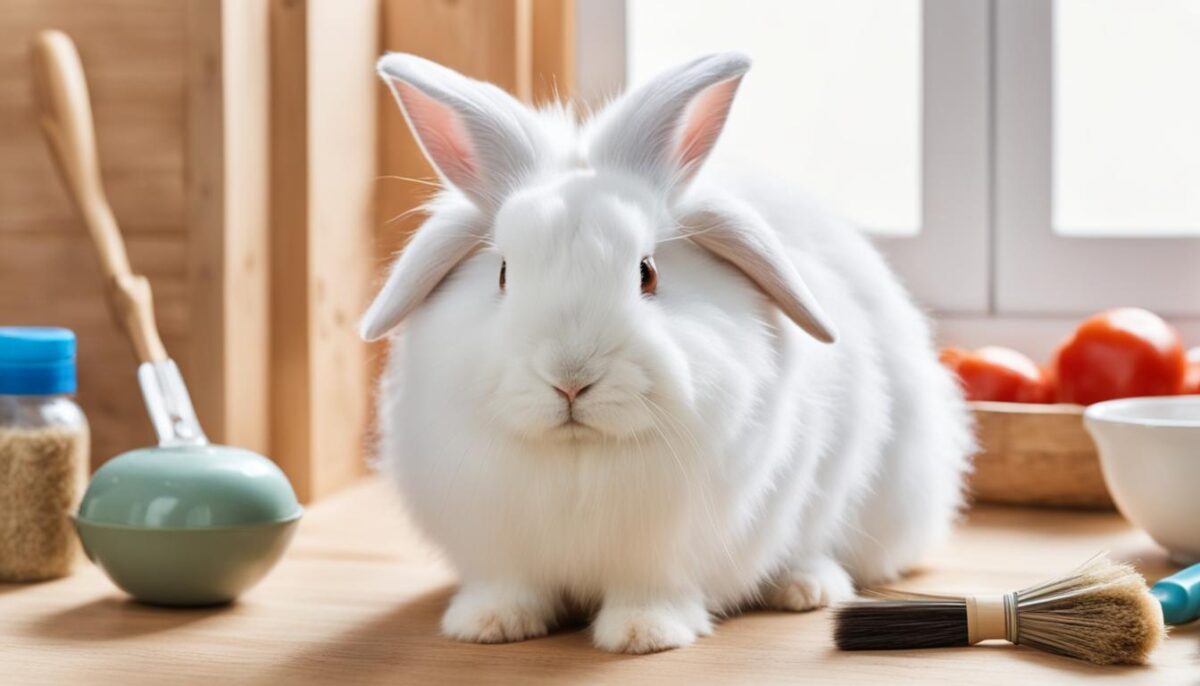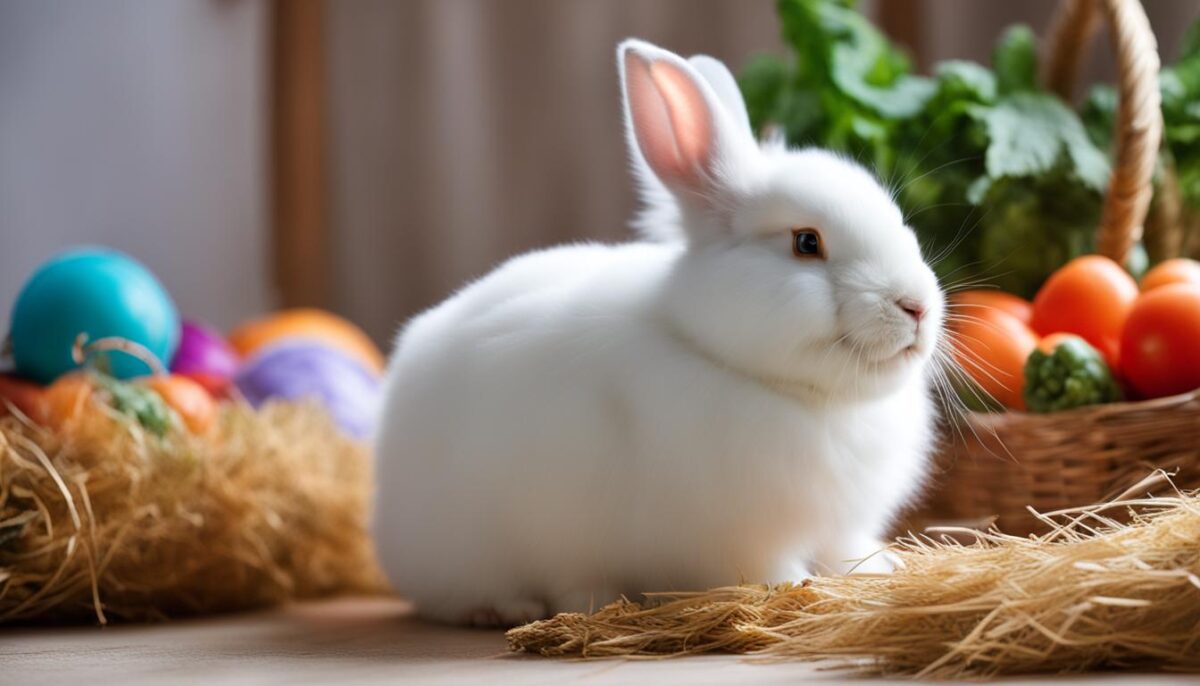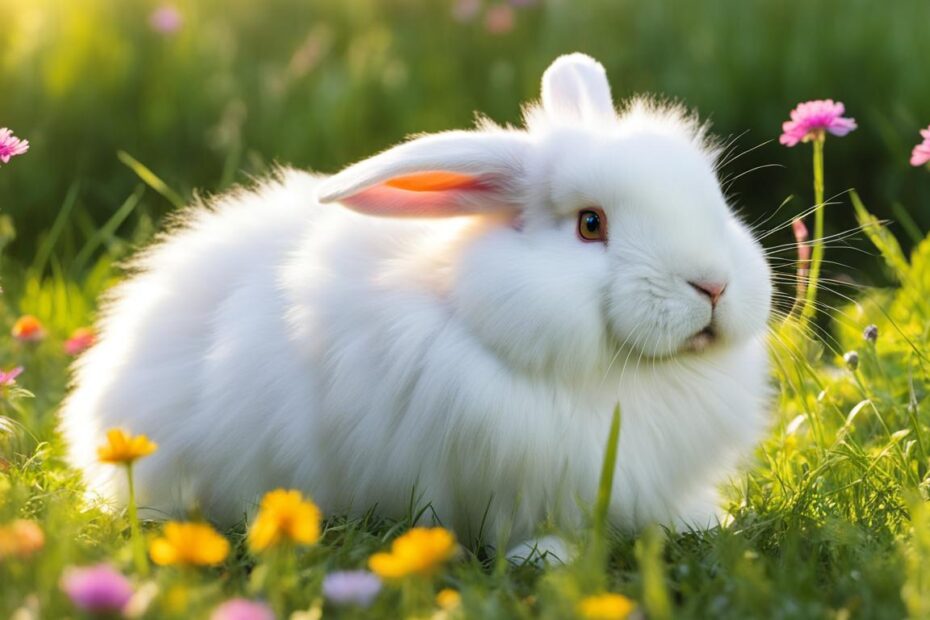Welcome to the captivating world of the White Angora Rabbit, a breed renowned for its soft and luxurious coat. These adorable bunnies are known for their fluffy white fur, making them a favorite among rabbit enthusiasts. Whether you’re considering bringing one into your home or simply curious about this charming breed, we’re here to guide you through all that you need to know about these beautiful creatures.
Originally from Ankara, Turkey, Angora rabbits have a rich history dating back to the 18th century. Their long, silky fur has captivated people worldwide, earning them a special place in the hearts of many. These gentle and friendly rabbits come in various breeds, including English, French, Satin, and Giant, each with their unique characteristics.
Key Takeaways:
- White Angora rabbits are known for their soft and luxurious fur.
- They have a rich history dating back to the 18th century.
- Angora rabbits come in various breeds, including English, French, Satin, and Giant.
- Their docile and friendly nature makes them wonderful companions.
- Proper care and grooming are essential to maintain their coat’s quality and overall health.
The Characteristics of Angora Rabbits
Angora rabbits are a fascinating breed known for their beautiful fur and charming temperament. Whether you’re a rabbit enthusiast or considering getting a white Angora rabbit as a pet, it’s essential to understand their unique characteristics. Here, we’ll explore the various aspects that make Angora rabbits truly special.

Colors and Fur
Angora rabbits come in a variety of colors, including white, black, blue, chocolate, and lilac. However, white Angora rabbits are particularly famous for their stunning appearance. These rabbits have long, soft fur that covers their entire body, including their face and ears. Their fur is incredibly dense and luxurious, giving them a distinctively fluffy and cuddly appearance.
Breeds and Physical Characteristics
There are four main types of Angora rabbits: English, French, Giant, and Satin. Each breed has its own set of physical characteristics. English Angoras are medium in size, with a compact body and upright ears. French Angoras are slightly larger, with a distinctive wool cap on their head and long ears that lop downwards. Giant Angoras are the largest of the Angora breeds, known for their large size and plush fur. Satin Angoras have a satin-like sheen to their fur, which reflects light beautifully.
Aside from size and ear shape, the fur length also varies among the different breeds. English Angoras have medium-length fur, while French and Giant Angoras have longer fur that requires more grooming. Satin Angoras have shorter fur compared to the other breeds.
Lifespan and Temperament
With proper care, Angora rabbits can live between 7 and 12 years. These rabbits have a gentle and docile temperament, making them great companions for individuals and families alike. They are known for their friendly nature, making them a popular choice among rabbit enthusiasts.
It’s important to note that while Angora rabbits are generally friendly, they require regular handling and socialization to maintain their sociable behavior. With a patient and nurturing approach, you can create a deep bond with your Angora rabbit and enjoy their delightful personality.
Caring for White Angora Rabbits
Proper care is essential for white Angora rabbits, as their long fur requires regular grooming to prevent matting. Here are some care tips to ensure the well-being of your fluffy companion:
- Grooming: White Angora rabbits should be groomed at least once a week to maintain the quality of their wool. Use a soft brush or comb specifically designed for rabbits to gently remove any tangles or matting. This not only keeps their fur in pristine condition but also helps prevent the formation of painful mats that can lead to skin issues.
- Temperature control: Due to their dense fur, Angora rabbits are prone to overheating. Ensure that their living environment is well-ventilated and kept at an ideal temperature range of 60-70°F (15-21°C). Avoid exposing them to direct sunlight or placing their enclosure in a hot, stuffy room.
- Living environment: Provide a spacious and comfortable living environment for your white Angora rabbit. This includes a cage or hutch that is large enough for them to hop around, stretch their legs, and exhibit natural behaviors. Line the bottom with soft bedding material, such as straw or hay, to provide warmth and comfort.
- Diet: White Angora rabbits require a balanced diet consisting of high-quality hay, fresh vegetables, and specialized rabbit pellets. The majority of their diet should be fresh hay, which aids in digestion and helps prevent dental problems. Introduce a variety of leafy greens and occasional treats, but be cautious of overfeeding, as obesity can lead to health issues. Consult with a veterinarian for specific dietary recommendations based on your rabbit’s age and weight.
Giving your white Angora rabbit the proper care and attention they need will ensure their overall health and well-being. Remember to spend quality time bonding with your furry friend, provide mental stimulation through safe toys and enriching activities, and schedule regular check-ups with a rabbit-savvy veterinarian to ensure they live a happy and fulfilling life.

Housing and Environment for White Angora Rabbits
Creating the ideal housing and environment for your white Angora rabbits is crucial to their well-being and happiness. These fluffy creatures require a spacious and secure living space to thrive. Here are some essential factors to consider:
- Enclosure Size: The enclosure for white Angora rabbits should be at least four times their size. This allows them to hop, play, and exercise comfortably. Make sure the enclosure has a solid floor to prevent any injury to their delicate feet.
- Well-Ventilated Hutch: The hutch should provide adequate ventilation to ensure fresh air circulation. However, it is essential to protect the rabbits from extreme weather conditions, including direct sunlight, heavy rain, or strong winds. Providing shelter and insulation in the hutch helps maintain a comfortable environment.
- Regular Grooming: White Angora rabbits have long, luxurious fur that requires regular grooming to prevent matting. Grooming should be done at least once a week to keep their coats clean and free from tangles. This not only keeps them looking their best but also promotes their overall health and well-being.
- Mental and Physical Stimulation: These intelligent bunnies need mental and physical stimulation to prevent boredom and promote a happy lifestyle. Providing safe toys and objects for them to explore and play with can keep them entertained and engaged.
Creating a safe and escape-proof environment is essential for the overall well-being and happiness of white Angora rabbits. Their housing should prioritize their comfort, safety, and natural instincts.

| Feature | Description |
|---|---|
| Enclosure Size | The enclosure should be at least four times the size of the rabbit, allowing ample space for hopping and playing. |
| Well-Ventilated Hutch | The hutch should be well-ventilated to ensure fresh air circulation, while also protecting the rabbit from extreme weather conditions. |
| Regular Grooming | Grooming should be done at least once a week to prevent matting and keep the rabbit’s coat clean and healthy. |
| Mental and Physical Stimulation | Providing safe toys and objects for the rabbit to interact with helps keep them mentally and physically stimulated. |
Health and Nutrition for White Angora Rabbits
White Angora rabbits, like any other breed, require proper care and attention to maintain their overall health and well-being. In this section, we will discuss some essential care tips and grooming practices that will help you ensure the longevity and happiness of your white Angora rabbit.
Grooming: Preventing Wool Block
Grooming plays a vital role in the health of your white Angora rabbit, particularly in preventing a condition known as wool block. Wool block occurs when the rabbit ingests excessive amounts of fur during self-grooming, leading to the formation of hairballs in their digestive system. To prevent wool block:
- Regularly brush your white Angora rabbit’s fur to remove loose hairs and prevent matting.
- Consider using a grooming tool specifically designed for Angora rabbits, such as a slicker brush or comb.
- Provide your rabbit with a high-fiber diet, including plenty of hay, to encourage healthy digestion and prevent excessive fur ingestion.
Preventing Heat Stress
White Angora rabbits have a thick, dense coat that can make them more susceptible to heat stress, especially during warmer months. It’s crucial to provide a cool and well-ventilated environment to prevent overheating. Here are some tips:
- Ensure your rabbit’s enclosure is kept in a shaded area, away from direct sunlight.
- Provide fresh water at all times and consider placing a frozen water bottle in their enclosure to help regulate their body temperature.
- Avoid placing the rabbit’s enclosure near heat sources such as radiators or heaters.
By implementing these measures, you can help keep your white Angora rabbit comfortable and prevent the risk of heat stress.
Balanced Diet for Overall Health
Proper nutrition is vital for the overall health and well-being of your white Angora rabbit. Here are some guidelines for a balanced diet:
- Offer a good quality, fiber-rich hay as the primary component of their diet.
- Supplement their diet with commercially available rabbit pellets formulated specifically for Angora rabbits.
- Introduce fresh vegetables and herbs into their diet, such as leafy greens, carrots, and parsley.
It’s important to monitor their diet and make adjustments as necessary. Consult with a veterinarian experienced in rabbit care for personalized dietary recommendations based on your rabbit’s specific needs.
Regular veterinary care is essential for the ongoing health and well-being of your white Angora rabbit. A qualified veterinarian can provide check-ups, vaccinations, and address any health issues that may arise. Remember to schedule routine visits and follow their guidance to ensure a happy and healthy life for your fluffy companion.
Conclusion
White Angora rabbits are not just adorable fluffy creatures, but they also bring joy and beauty to our lives. With their soft, luxurious fur and charming personalities, they make perfect companions for rabbit enthusiasts of all ages. Whether you are looking to have a pet or considering breeding and showing, white Angora rabbits offer a unique and rewarding experience.
To ensure the well-being of these delightful creatures, it is essential to provide them with proper care. This includes creating a spacious and secure living environment, ensuring a balanced diet of hay, pellets, and fresh vegetables, and regular grooming to maintain the quality of their wool.
When taken care of with love and dedication, white Angora rabbits can thrive and provide years of companionship and beauty. So, if you are in search of a white rabbit for sale or seeking more white Angora rabbit information, consider the captivating world of these fluffy bunnies. They are sure to enchant you with their softness and win your heart with their delightful personality.
FAQ
What are the different breeds of Angora rabbits?
The different breeds of Angora rabbits include English, French, Satin, and Giant.
What is the lifespan of a white Angora rabbit?
White Angora rabbits have a lifespan of 7 to 12 years when properly cared for.
How often do white Angora rabbits need to be groomed?
White Angora rabbits should be groomed at least once a week to prevent matting of their long fur.
What should I feed my white Angora rabbit?
A balanced diet for a white Angora rabbit consists of hay, pellets, and fresh vegetables.
How should I create a living environment for my white Angora rabbit?
It is important to provide a spacious and secure living environment with a solid floor and proper ventilation.
What health issues are white Angora rabbits prone to?
White Angora rabbits are prone to wool block, heat stress, and dental problems.


